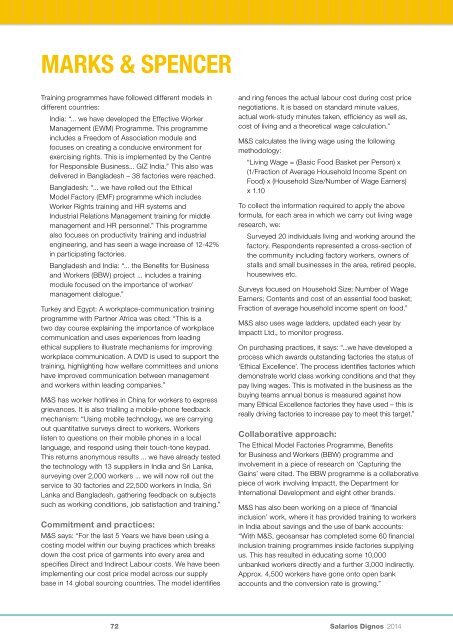17Investigación SALARIOS dignos definitiva
17Investigación SALARIOS dignos definitiva
17Investigación SALARIOS dignos definitiva
You also want an ePaper? Increase the reach of your titles
YUMPU automatically turns print PDFs into web optimized ePapers that Google loves.
MARKS & SPENCER<br />
Training programmes have followed different models in<br />
different countries:<br />
India: “... we have developed the Effective Worker<br />
Management (EWM) Programme. This programme<br />
includes a Freedom of Association module and<br />
focuses on creating a conducive environment for<br />
exercising rights. This is implemented by the Centre<br />
for Responsible Business... GIZ India.” This also was<br />
delivered in Bangladesh – 38 factories were reached.<br />
Bangladesh: “... we have rolled out the Ethical<br />
Model Factory (EMF) programme which includes<br />
Worker Rights training and HR systems and<br />
Industrial Relations Management training for middle<br />
management and HR personnel.” This programme<br />
also focuses on productivity training and industrial<br />
engineering, and has seen a wage increase of 12-42%<br />
in participating factories.<br />
Bangladesh and India: “... the Benefits for Business<br />
and Workers (BBW) project ... includes a training<br />
module focused on the importance of worker/<br />
management dialogue.”<br />
Turkey and Egypt: A workplace-communication training<br />
programme with Partner Africa was cited: “This is a<br />
two day course explaining the importance of workplace<br />
communication and uses experiences from leading<br />
ethical suppliers to illustrate mechanisms for improving<br />
workplace communication. A DVD is used to support the<br />
training, highlighting how welfare committees and unions<br />
have improved communication between management<br />
and workers within leading companies.”<br />
M&S has worker hotlines in China for workers to express<br />
grievances. It is also trialling a mobile-phone feedback<br />
mechanism: “Using mobile technology, we are carrying<br />
out quantitative surveys direct to workers. Workers<br />
listen to questions on their mobile phones in a local<br />
language, and respond using their touch-tone keypad.<br />
This returns anonymous results ... we have already tested<br />
the technology with 13 suppliers in India and Sri Lanka,<br />
surveying over 2,000 workers ... we will now roll out the<br />
service to 30 factories and 22,500 workers in India, Sri<br />
Lanka and Bangladesh, gathering feedback on subjects<br />
such as working conditions, job satisfaction and training.”<br />
Commitment and practices:<br />
M&S says: “For the last 5 Years we have been using a<br />
costing model within our buying practices which breaks<br />
down the cost price of garments into every area and<br />
specifies Direct and Indirect Labour costs. We have been<br />
implementing our cost price model across our supply<br />
base in 14 global sourcing countries. The model identifies<br />
and ring fences the actual labour cost during cost price<br />
negotiations. It is based on standard minute values,<br />
actual work-study minutes taken, efficiency as well as,<br />
cost of living and a theoretical wage calculation.”<br />
M&S calculates the living wage using the following<br />
methodology:<br />
“Living Wage = (Basic Food Basket per Person) x<br />
(1/Fraction of Average Household Income Spent on<br />
Food) x (Household Size/Number of Wage Earners)<br />
x 1.10<br />
To collect the information required to apply the above<br />
formula, for each area in which we carry out living wage<br />
research, we:<br />
Surveyed 20 individuals living and working around the<br />
factory. Respondents represented a cross-section of<br />
the community including factory workers, owners of<br />
stalls and small businesses in the area, retired people,<br />
housewives etc.<br />
Surveys focused on Household Size; Number of Wage<br />
Earners; Contents and cost of an essential food basket;<br />
Fraction of average household income spent on food.”<br />
M&S also uses wage ladders, updated each year by<br />
Impactt Ltd., to monitor progress.<br />
On purchasing practices, it says: “...we have developed a<br />
process which awards outstanding factories the status of<br />
‘Ethical Excellence’. The process identifies factories which<br />
demonstrate world class working conditions and that they<br />
pay living wages. This is motivated in the business as the<br />
buying teams annual bonus is measured against how<br />
many Ethical Excellence factories they have used – this is<br />
really driving factories to increase pay to meet this target.”<br />
Collaborative approach:<br />
The Ethical Model Factories Programme, Benefits<br />
for Business and Workers (BBW) programme and<br />
involvement in a piece of research on ‘Capturing the<br />
Gains’ were cited. The BBW programme is a collaborative<br />
piece of work involving Impactt, the Department for<br />
International Development and eight other brands.<br />
M&S has also been working on a piece of ‘financial<br />
inclusion’ work, where it has provided training to workers<br />
in India about savings and the use of bank accounts:<br />
“With M&S, geosansar has completed some 60 financial<br />
inclusion training programmes inside factories supplying<br />
us. This has resulted in educating some 10,000<br />
unbanked workers directly and a further 3,000 indirectly.<br />
Approx. 4,500 workers have gone onto open bank<br />
accounts and the conversion rate is growing.”<br />
72<br />
Salarios Dignos 2014


